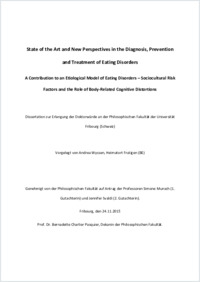State of the art and new perspectives in the diagnosis, prevention and treatment of eating disorders : a contribution to an etiological model of eating disorders - sociocultural risk factors and the role of body-related cognitive distortions
- Wyssen, Andrea
- Munsch, Simone (Degree supervisor)
-
2015
1 ressource en ligne (184 p.)
Thèse de doctorat: Université de Fribourg, 2015
English
On the basis of the German S3-guidelines, this thesis provides a comprehensive overview of the state of the art for the diagnosis, prevention and treatment of eating disorders (EDs). Publication 1 constitutes a critical review of the guidelines regarding their applicability to the clinical practice in Switzerland. The importance of early detection and accurate diagnosis of subthreshold and threshold EDs is emphasized. Consequently, it is argued that valid screening instruments need to be developed and implemented, followed by appropriate preventive efforts. Furthermore, the guidelines provide an important source of orientation and information for evidence-based treatment. In this context the difficulty of overcoming the science-practice-gap as well as the challenge of the implementation of evidence-based interventions is discussed and the necessity for stepped-care approaches and tailored interventions is highlighted. Based on the observation that ED treatment faces multiple challenges and more effective treatments are needed, an attempt is made to develop new perspectives. A basic requirement in this regard is an elaborated understanding of factors that contribute to the development and maintenance of EDs. Due to the high prevalence of body dissatisfaction (BD) in the general population and the finding that BD poses one of the best established risk factors for EDs, a basic etiological model of EDs with a focus on sociocultural risk factors is described. In publication 2 the proposed model is complemented with a newly introduced factor termed Thought-Shape Fusion (TSF) that describes the susceptibility to body-related cognitive distortions, negative emotions and dysfunctional behaviors. TSF is conceptualized as a cognitive vulnerability factor within a cognitive-behavioral framework of EDs. The main result of publication 2 revealed that TSF partially mediates the relationship between BD and disordered eating. Publication 3 goes a step further in demonstrating the inducibility of body-related cognitive distortions through thin-ideal imagination following a media exposure (TSF-B). This underlines the relevance of such cognitive processes in everyday settings where individuals are repeatedly confronted with media contents that promote an unattainable body ideal. It is proposed to consider TSF/ TSF-B in etiological models and new approaches in prevention and treatment of EDs.
- Faculty
- Faculté des lettres et des sciences humaines
- Language
-
- English
- Classification
- Psychology
- Notes
-
- Ressource en ligne consultée le 05.01.2016
- License
-
License undefined
- Identifiers
-
- RERO DOC 257986
- URN urn:nbn:ch:rero-002-114852
- RERO R008335023
- Persistent URL
- https://folia.unifr.ch/unifr/documents/304669
Statistics
Document views: 412
File downloads:
- Texte intégral: 362
